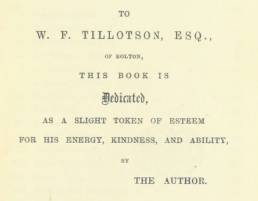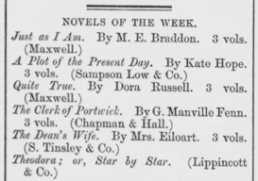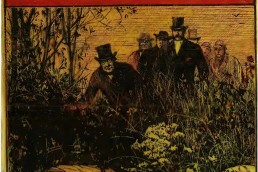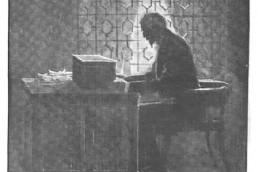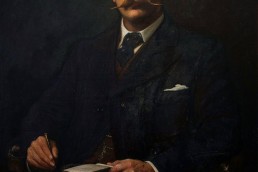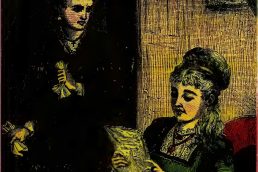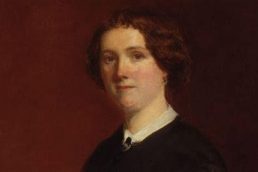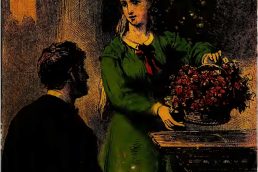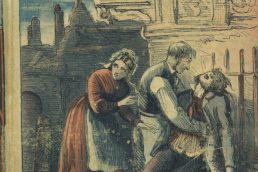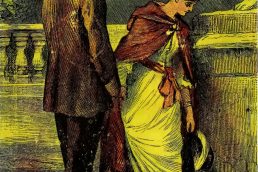Serialised fiction in the Bolton Weekly Journal – Quite True (1880) by Dora Russell


Dora (Dorothy) Russell was born in 1829 in Northumberland. As Troy J. Bassett explains, she was the Daughter of Dorothy Bulman and George Greenwell, and Russell’s father was an estate manager and a colliery agent (2020). Russell and her family lived a comfortable middle-class life, educated at home and attended school briefly. Russell was a top author, feminist, and a socialist campaigner who won a fiction prize competition sponsored by the Newcastle Weekly Chronicle in 1870 (Bassett, 2020). Russell has links to Bolton through her stories serialised within the Bolton Weekly Journal. Bassett points out that Russell developed a successful and “close working relationship” with the Tillotson Fiction Bureau in Bolton, dedicating her 1878 novel, Beneath the Wave, to W. F. Tillotson ‘as a slight token of esteem for his energy, kindness, and ability’ (2020). In an interview with Russell published in a series of ‘biographical sketches’ titled Pen, Pencil, Baton and Mask (1896), Helen Black described Russell’s connection to the Tillotson’s in this way:
“Miss Russell obtained an introduction to Messrs. Tillotson & Son, of Bolton, Lancashire, whose well-known syndicate for supplying literature to newspapers has a world-wide reputation. The first novel that she wrote for the firm was ‘Footprints in the Snow.’ The book was not only very popular in England, but has been translated into many languages, and was a special favourite with Miss Russell’s much-regretted and valued friend, the late Mr Tillotson. From the date of this work until the present time Dora Russell’s connection with the firm has been close and constant, and again she always speaks in the highest terms of their probity and kindness” (1896, p.191).
Quite True was published weekly in the Bolton Weekly Journal from March 1880 to August 1880 and received varied reviews from critics at that time. The series has been said to have elements of murder and death. It is apparent from reading, that Quite True is consistent with the rest of Russell’s series’. The Examiner regarded the third volume of the novel to be “de trop” – undesirable or unwelcome (1881, p.89) – while the first and second volumes are enough to grasp the novel’s plot and conclusion. In the same review, Russell is praised for her novel as the book comes across as “very readable” (p.89).
Although The Examiner review of Russell’s novel is short, it is direct and straight to the point. This critic uses the words “not wanted” or “unwelcome” in relation to Dora’s third volume. Tellingly, the reviewer allows more space for plot summary than sustained critique of the novel (as was often the case in nineteenth-century reviews); if this critic felt rightly about Russell’s novel, they would surely have more criticism to offer. The critic does not leave much room for praise on Russell’s novel, though, and only describes the characters and the plot of the novel as “desperate” and “hardly correct” (p.89).
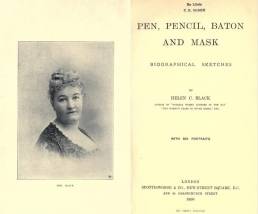

Alternately, The Athenaeum’s review of the novel is evidently different. A review that also examines Mary Elizabeth Braddon’s Just as I Am (1880), which was likewise serialised in the Bolton Weekly Journal, the section dedicated to Russell’s serialised novel is longer and the tone of the review is more upbeat. Quite True is regarded as “well woven, and in some of its incidents highly sensational” (1880, pp.496-497). The Athenaeum praises Russell for writing in “an unobjectionable manner” (p.497) while “describing human relations which a more fastidious or prudish writer might see fit to avoid” (p.497). The essay further declares that it cannot be “a very easy thing to blow one’s own trumpet” (p.496) and yet describes the protagonist of Russell’s novel as doing just that, notably managing to “please one’s listeners” (p.496). The continuation of Russell’s serialised fiction worked in her favour, despite the other not-so-good reviews. The critic of The Athenaeum is much more applauding of Russell’s talent and sufficiency in writing, as “like Miss Braddon, the author has had plenty of practice” (p.497).
You can read an interesting overview of Russell’s life, provided by Troy J. Bassett’s At the Circulating Library, here.
Bibliography
Anon. (1880) Novels of the week. The Athenaeum. [Online] 16 Oct (2764), pp.496-497. Available at: <https://search-proquest-com.ezproxy.bolton.ac.uk/britishperiodicals/docview/8967020/333669F287014A43PQ/20?accountid=9653&imgSeq=1>[Accessed 28 March 2021].
Anon. (1881) Quite True. Examiner. [Online] 22 Jan (3808), pp.88-89. Available at: <https://search-proquest-com.ezproxy.bolton.ac.uk/britishperiodicals/docview/8734709/fulltext/D74868C87E254F57PQ/1?accountid=9653&imgSeq=1> [Accessed 28 March 2021].
Bassett, T. J. (2020) At the Circulating Library Author Information: Dora Russell. [Online] Available at: <http://www.victorianresearch.org/atcl/show_author.php?aid=692> [Accessed 28 March 2021].
Black, H. (1896) Pen, Pencil, Baton and Mask: Biographical Sketches. London: Spottiswoode & Co. Available at: <https://archive.org/details/penpencilbatonma00blaciala/mode/2up?q=Bolton> [Accessed 4 April 2021].
Russell, D. (1878) Beneath the Wave: A Novel. London: John and Robert Maxwell. [Online] Available at: <http://access.bl.uk/item/viewer/ark:/81055/vdc_00000004F194> [Accessed 4 April 2021].
Russell, D. (1884) Out of Eden: A Novel. London: F.V. White. [Online] Available at: <http://access.bl.uk/item/viewer/ark:/81055/vdc_00000003A722> [Accessed 4 April 2021].

